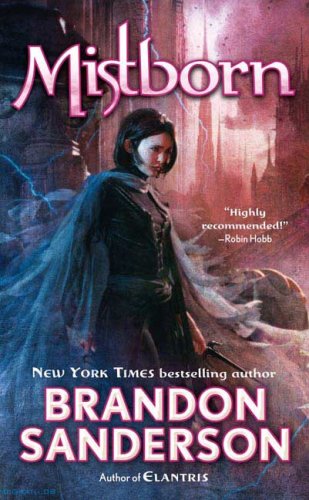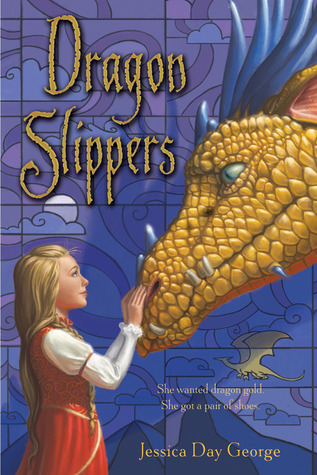Mistborn: The Final Empire is the first book in an epic fantasy trilogy by the same name, written by Brandon Sanderson. Normally I find epic fantasies to be a little too mature and just plain long for my tastes, but Mistborn was different. It wasn’t as mature as some I’ve read, and the first book was under 700 pages long, whereas most epic fantasy books that I’ve read approach 1,000 pages. With those two things going for it, as well as a plot and theme that were just plain awesome, Mistborn turned out to be the first epic I have really, really enjoyed.
The story centers around Vin, a skaa and a street urchin living with a crew of thieves in Luthadel, the capitol city of Luthadel. The skaa are the common people of the Final Empire, the peasants, the servants, the slaves, the ones who do the manual labor. They are treated like property by the noblemen, who relax in their opulent homes and casually execute any skaa who looks at them the wrong way. Vin has learned to distrust noblemen and everyone else. Then she falls in with a skaa named Kelsier, and slowly her shell of outer toughness begins to crack.
Kelsier is a man who has seen and experienced much. The scars on his arms mark him as the Survivor of what should have been a death sentence, and he has already tried once to defeat the Lord Ruler who has governed the Final Empire with a will of iron for a thousand years. Besides just being a visionary and a bold thinker, Kelsier has another advantage on his side. He is what is called a Mistborn, a person able to use Allomancy. Allomancy is the ability to harness certain powers through ingesting or “burning” metals. Unlike most of his crew, who can access one of the powers, Kelsier can use them all. And so can Vin.
When she joins his crew, Kelsier is preparing a skaa rebellion — one that he intends to be the largest skaa revolt in the history of the Final Empire. And this rebellion he intends to be a success. As he teaches Vin to use her powers, he and his friends begin the work of rousing the skaa and preparing them to fight the trained soldiers of the Lord Ruler and his ruthless killing machines, the Inquisitors. But rousing the skaa is no easy task. After a thousand years of subjection, most have forgotten what it is to feel any hope of freedom, and they have been beaten down and cowed for so long many do not dare raise their heads. Is being a Mistborn enough to accomplish all that needs to be done?
I enjoyed this book a LOT. As I said before, most epic fantasies that I’ve read have had too much mature content for my tastes. Although Mistborn does have some, it was mostly in a referring-to sort of way, and there was only a little. I was also really happy with the magic and world of Mistborn. There was detail, but not an overwhelming abundance. Brandon Sanderson is very good at creating unique systems of magic and describing them well. He also explained enough of the world for the book to make sense, but left plenty of questions unanswered. I still want to know what the kandra and koloss are, and there’s a lot I don’t know about the Lord Ruler. I am very much looking forward to reading the next two books in this trilogy.
I was also really impressed by the characters in this book. It was the characters who made Mistborn so appealing to me, actually, particularly Kelsier. It was hard not to get caught up in his vision just reading the book. And his character has many layers that are slowly peeled back as the book progresses. Vin’s character also goes through some changes as she goes from a timid, fearful, and very stubborn girl to a confident, brave, and very stubborn young woman with incredible powers. I can honestly say there was nothing I did not like about Kelsier and Vin, and Kelsier’s group of friends and allies were no less intriguing and well-written.
The theme of this book was really, really captivating, though, and is another big reason of why I was so impressed by Mistborn. In this book Brandon Sanderson brings up a very interesting question, especially when relating to books and stories, and that is: what if the good guys don’t always win? What if the bad guys come out on top? On the basis of that question alone, you can expect to find a very interesting story, but Brandon Sanderson also told a story with amazing characters, an intriguing world, and all those other things that make a book great. And for a final point in its favor, this book is less than 700 pages long, even though it’s definitely an epic. If you’re in the mood for a good, well-written fantasy but don’t have 36 consecutive hours to devote to just reading, Mistborn: The Final Empire is definitely one I’d suggest. In fact, I’d suggest the entire Mistborn trilogy, though I haven’t gotten around to reading anything but the first book yet. It was that good.





